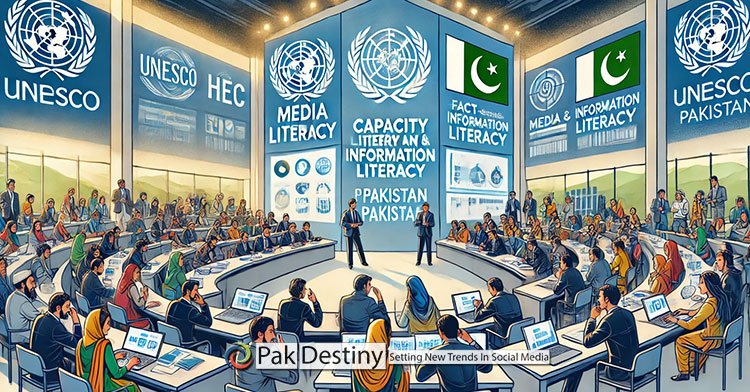In collaboration with the Higher Education Commission (HEC) of Pakistan, UNESCO organized a capacity-building workshop aimed at enhancing the skills of academics in designing a Media and Information Literacy (MIL) course for BS Media and Communication Studies programs. The Department of Digital Media at the University of the Punjab facilitated the event, while Media Foundation 360 coordinated the initiative.
Hamza Swati, National Program Communication Officer at UNESCO, addressed the participants, highlighting the importance of integrating MIL into academic curricula. He emphasized that equipping students with media literacy skills is crucial for navigating today’s intricate media environment. The workshop featured insights from experts including Hadyat Ullah Kasi, Deputy Director (Academics) HEC; Dr. Mehwish Raza, Deputy Head of the Centre for Learning & Teaching at Forman Christian College University; and Prof. Dr. Savera Shami, Chairperson of the Department of Digital Media at the University of the Punjab. Dr. Shami, who also serves as the Research Lead for UNESCO’s MIL Framework Project in Pakistan, shared key findings from the ongoing research and discussed essential aspects of the draft strategy.
Participants acknowledged that the rapid spread of misinformation and disinformation presents a major challenge in today’s world, affecting individuals, communities, and societies at large. This workshop was part of a broader consultative effort to gather insights from key stakeholders, contributing to the development of a robust MIL framework. More than 20 faculty members, including Heads of Departments, Associate Professors, Assistant Professors, and Lecturers from top universities in Punjab, collaborated to formulate a curriculum outline based on UNESCO’s MIL principles. The goal was to equip students with critical thinking skills, foster informed digital citizenship, and promote responsible media engagement to combat misinformation and digital threats effectively.
A major outcome of the workshop was the creation of a structured curriculum template for Media and Information Literacy (MIL). This curriculum, adapted from UNESCO’s Media and Information Literacy Curriculum for Teachers’ Guidebook, has been tailored to align with Pakistan’s educational and socio-cultural context. Once implemented, it will provide a solid foundation for integrating MIL into academic programs nationwide, cultivating a generation of critically aware, media-literate, and digitally responsible individuals across Pakistan.





